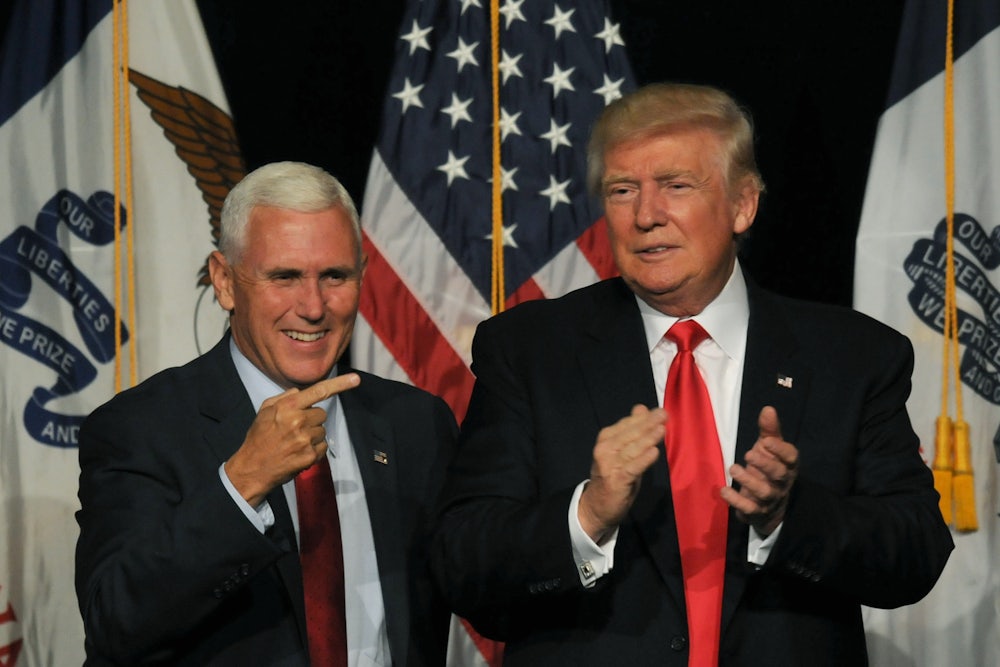Conservatives and most media observers were in agreement this past weekend that Hillary Clinton had erred on Friday in saying “you could put half of Trump’s supporters into what I call the basket of deplorables.” Publications from The Washington Post to The New Yorker labeled the remark a “gaffe”—even though she’d used the word “deplorables” just a week prior—and Clinton later walked it part-way back, saying, “I was ‘grossly generalistic,’ and that’s never a good idea. I regret saying ‘half’—that was wrong.”
As time goes on, though, “baskets of deplorables” looks less like a gaffe and more like a forcing mechanism to make Republicans grapple with an awkward truth.
Recall that there were two parts to this supposed blunder. First that she called certain Trump supporters “deplorables” for being “racist, sexist, homophobic, xenophobic, Islamaphobic.” Second, that she claimed their ranks amounted to “half” of Trump’s base. Though Clinton retracted the numerical estimate, the Trump campaign’s reaction was telling. They were far less concerned with the broad brush Clinton used than that she used any brush at all.
Wow, Hillary Clinton was SO INSULTING to my supporters, millions of amazing, hard working people. I think it will cost her at the Polls!
— Donald J. Trump (@realDonaldTrump) September 10, 2016
“The men and women who support Donald Trump’s campaign are hard working Americans,” Mike Pence insisted, categorically, at the Values Voters Summit over the weekend, “they are not a basket of anything. They are Americans and they deserve your respect.”
If there was a “gaffe” this week, it wasn’t Clinton claiming that half of Trump supporters are unsavory, but the Trump campaign suggesting that the correct number is zero. Trump and Pence’s unwillingness to cede an inch to Clinton leashed them to the filth of the nation, which in turn revealed the truth of her critique in skin-crawling fashion.
On Monday, Pence appeared on CNN and refused to call David Duke, Trump’s most infamous white supremacist supporter, “deplorable.” Then he went on Fox News and refused again.
Pence claims he won’t use the term to describe the former Klu Klux Klan leader because he’s “not in the name-calling business.” But Pence’s running mate rode name-calling to the Republican nomination (“Low-Energy Jeb,” “Lyin’ Ted”), and continues to rile up supporters by referring to Clinton as “Crooked Hillary.”
It’s obviously normal in politics for party members to hold their co-partisans to lower standards than their opponents. House Speaker Paul Ryan has reluctantly scolded Trump for making racist comments, but he can always be counted on to criticize Clinton in full-throated, unambiguous ways for far lesser sins. By the same token, it’s natural that Pence would be comfortable attacking Democrats in terms he’d never use to describe Trump or Ryan.
The damning thing is that Pence and the Trump campaign are now extending that umbrella of rhetorical protection to an unrepentant Klansman. In their haste to condemn Clinton for using the term “deplorable,” the Trump campaign robbed itself of control over who it gets to present as its allies, and who it does not.
The truth, though, is that Trump set this trap for himself a long time ago.
The Trump campaign has gone to odd lengths to convince Republican voters (suburban women in particular) that Trump isn’t unacceptably racist. Thus the strange recent spectacle of Trump addressing white suburban audiences with entreaties to black people in which he depicted their lives as fully unredeemed (“You live in poverty, your schools are no good, you have no jobs”). A less clownish way to accomplish the same goal would be to treat Clinton’s point with some level of nuance. Yes, some bad people have attached themselves to our campaign, as they have with every campaign in human history, but we reject them and will not be serving their interests from the White House.
That option is foreclosed for Trump because these people prop up his campaign—not just in the sense that he can’t relinquish the white supremacist vote in November, but in the sense that his campaign chair and some of his top surrogates are white nationalist heroes. What they are finding is that it’s impossible to play deplorable to the deplorables, and admirable to the admirables, without giving away the game to one or the other.
If they admit that Duke and his ilk are “deplorable,” then all that’s left is to determine the size of the basket, and then dump the whole thing out. Is alt-right leader Milo Yiannopoulos deplorable? What about Maine’s racist governor, Paul LePage? What about Duck Dynasty’s Phil Robertson, who compared gay sex to bestiality and said pre-Civil Rights-era black people “were godly; they were happy; no one was singing the blues”?
Wittingly or not, Clinton has tricked Trump and his team into pulling back a very thin veil on an element of far-right politics they’d hoped to smuggle into power undetected. She no longer has to defend the claim that some of Trump’s supporters are deplorable.
Spox for UT Sen. Mike Lee on his meeting with Pence: "Lee emphasized that Republicans must identify David Duke’s racism as deplorable"
— Ali Rogin (@AliABCNews) September 13, 2016
Trump’s fellow Republicans are doing that for her—and they’re demanding he admit as much himself.
